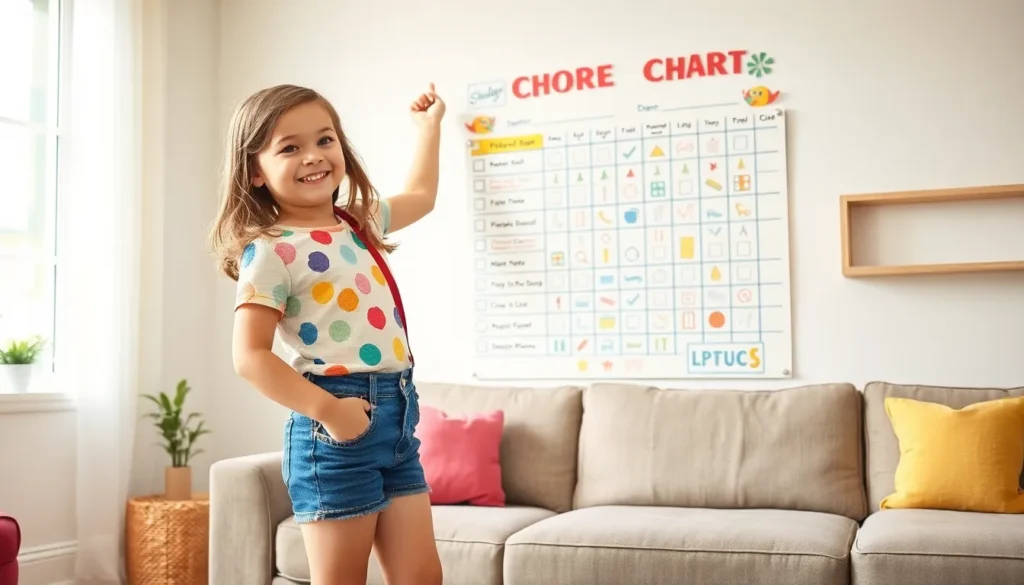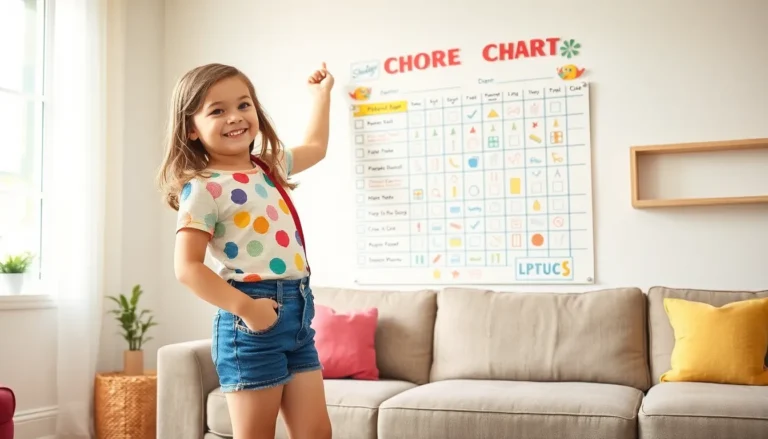Table of Contents
ToggleNavigating the teenage years can feel like trying to solve a Rubik’s Cube blindfolded. One moment, they’re a bundle of joy; the next, they’re channeling their inner rebel. Disciplining teens isn’t just about setting rules; it’s about mastering the art of balancing authority with understanding.
Imagine trying to convince a teenager that doing chores is a rite of passage rather than a punishment. It’s a challenge, but with the right approach, parents can turn these moments into valuable life lessons. By mixing humor with firm guidance, they can foster responsibility while keeping the peace at home. After all, who knew that discipline could be both effective and entertaining?
Understanding Disciplining Teens
Disciplining teens involves a nuanced approach that balances authority with empathy. Recognizing the significance of these years aids parents in guiding adolescents effectively.
Importance of Discipline
Discipline plays a crucial role in shaping a teen’s values. Setting clear boundaries fosters responsibility and self-control. Parents teach essential life skills through consistent expectations and consequences. Teens gain a sense of security when they understand limits, making it easier for them to navigate challenging situations. This guidance lays the groundwork for future decision-making and independence.
Common Misconceptions
Many parents misunderstand discipline, equating it with punishment. They often believe strictness breeds respect, yet respect develops through trust and communication. Some tend to ignore the importance of collaboration with teens in establishing rules. Engaging adolescents in discussions not only empowers them but also fosters accountability. Misconceptions can lead to frustration, as the effectiveness of positive discipline often gets overlooked. Emphasizing understanding rather than control creates a more constructive environment for growth.
Effective Discipline Strategies

Effective discipline combines authority and understanding. Implementing certain strategies enhances the parenting approach during the teenage years.
Positive Reinforcement
Positive reinforcement encourages desired behaviors in teens. It involves acknowledging achievements, whether academic, social, or personal. Praising efforts and offering rewards strengthens the likelihood of repetition. For instance, acknowledging a teen’s commitment to schoolwork can motivate them to maintain that effort. Recognizing small successes cultivates self-esteem, promoting a sense of personal responsibility. Parents can create an environment that fosters growth by verbally reinforcing good behavior and offering small rewards. This method helps teens connect positive actions to gratifying experiences, making them more likely to replicate those actions.
Setting Boundaries
Setting clear boundaries provides essential structure in a teen’s life. Defined expectations create a framework for behavior, allowing teens to understand limits. Parents benefit from clearly expressing rules and consistent consequences. For instance, establishing guidelines about curfews or screen time ensures teens grasp the importance of responsibility. Communicating consequences directly and consistently discourages rebellious or disrespectful behavior, promoting accountability. When parents involve teens in discussions about these boundaries, ownership and understanding grow stronger. Such collaboration lays a foundation for healthy decision-making, developing crucial skills for adulthood.
The Role of Communication
Effective communication forms the backbone of disciplining teens. Parents who prioritize open conversations foster trust and understanding, crucial in navigating the complexities of adolescence.
Open Dialogue with Teens
Encouraging open dialogue creates a space where teens feel safe sharing thoughts. Parents can initiate conversations by asking specific questions about daily experiences and challenges. Sharing their own experiences can enrich discussions, demonstrating vulnerability and relatability. Inviting teens to express their feelings about rules promotes engagement and accountability. When teens feel heard, they’re more likely to respect and understand family expectations. Ultimately, this approach strengthens the parent-teen relationship, aiding in conflict resolution and reducing misunderstandings.
Active Listening Techniques
Active listening plays a vital role in effective communication with teens. When parents demonstrate genuine interest, they validate their teen’s feelings. Using reflective statements helps parents clarify what their teen expresses, ensuring accurate understanding. Nonverbal cues, such as maintaining eye contact and nodding, encourage teens to share more openly. Parents should avoid interrupting the conversation, allowing their teens to articulate thoughts fully. Summarizing key points at the end of a discussion reinforces comprehension and shows attentiveness. These techniques not only enhance communication but also build a stronger foundation for mutual respect and understanding.
Consequences and Their Impact
Consequences play a vital role in the discipline of teens. They provide essential learning experiences that shape behavior and decision-making.
Natural Consequences
Natural consequences occur as a direct result of a teen’s actions. For instance, if a teen neglects their homework, they may face a lower grade. Experiencing the effects of poor choices promotes awareness and responsibility. Teens learn to associate their actions with outcomes, reinforcing the understanding that choices matter. These consequences are often powerful teachers, encouraging adolescents to think critically about their decisions. It becomes clear that allowing natural consequences to unfold can lead to growth and reflection. Parents must recognize the value of stepping back, ensuring that teens face these real-life implications.
Logical Consequences
Logical consequences are imposed by parents, designed to connect directly with a teen’s behavior. For instance, if a teen disregards curfew, a fitting response may involve a restriction on social outings for a specified time. Parents establish logical consequences to illustrate the direct link between actions and outcomes. By aligning consequences with specific behaviors, accountability strengthens. It empowers teens to understand the effects of their choices while also promoting self-regulation. Communicating expectations and ensuring consequences are consistent cultivates an environment of trust and respect. These practices help create a nurturing space for growth, focusing on constructive rather than punitive measures.
Disciplining teens is a delicate balance that requires patience and understanding. By fostering open communication and setting clear boundaries, parents can create a supportive environment that encourages growth. Emphasizing positive reinforcement and logical consequences helps teens learn responsibility while maintaining their self-esteem.
Ultimately, it’s about building trust and respect through consistent dialogue. When parents engage their teens in discussions about rules and expectations, they empower them to take ownership of their actions. This approach not only strengthens the parent-teen relationship but also equips adolescents with the skills they need to navigate life’s challenges. Through thoughtful discipline, parents can guide their teens toward becoming responsible and independent individuals.







